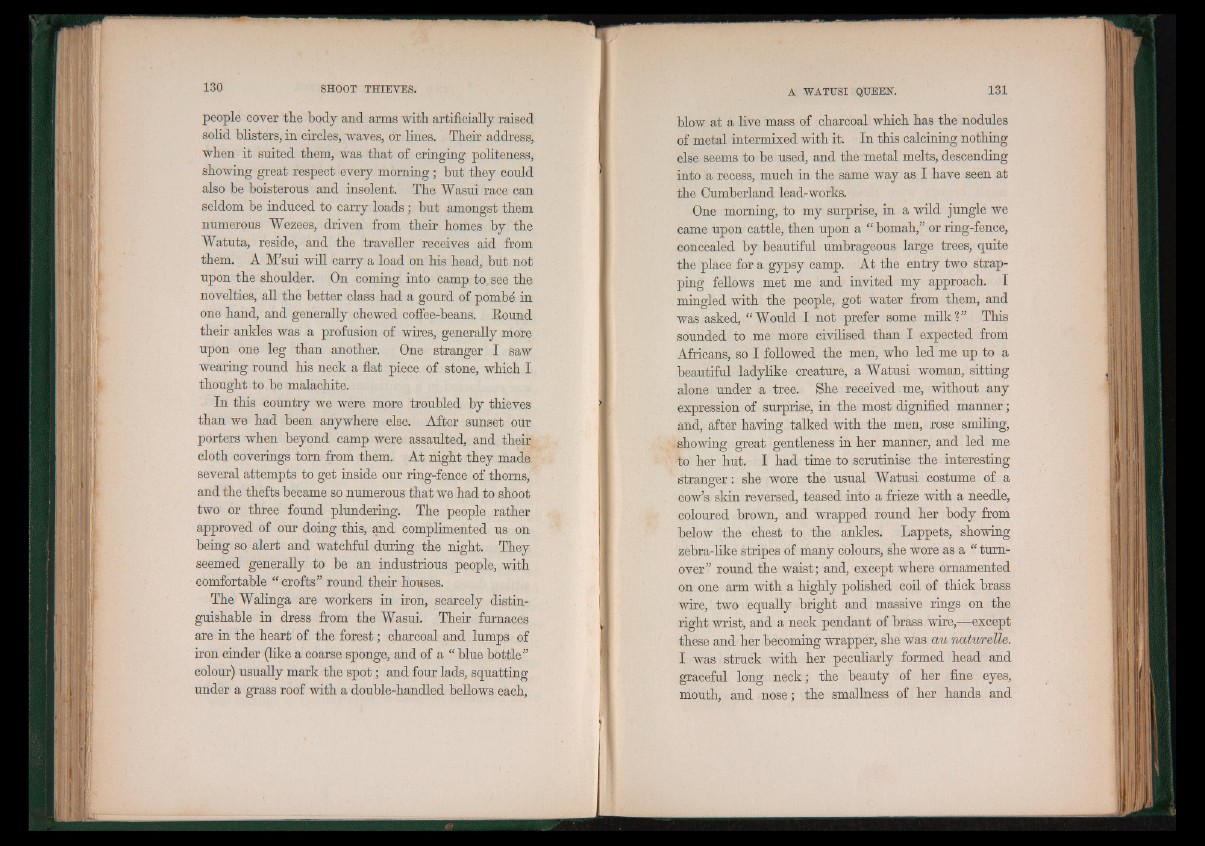
people cover the body and arms with artificially raised
solid blisters, in circles, waves, or lines. Their address,
when it suited them, was that of cringing politeness,
showing great respect every morning; but they could
also be boisterous and insolent. The Wasui race can
seldom be induced to carry loads; but amongst them
numerous Wezees, driven from their homes by the
Watuta, reside, and the traveller receives aid from
them. A M’sui will carry a load on his head, but not
upon the shoulder. On coming into camp to, see the
novelties, all the better class had a gourd of pombd in
one hand, and generally chewed coffee-beans. Bound
their ankles was a profusion of wires, generally more
upon one leg than another. One stranger I saw
wearing round his neck a flat piece of stone, which I
thought to be malachite.
In this country we were more troubled by thieves
than we had been anywhere else. After sunset our
porters when beyond camp were assaulted, and their
cloth coverings torn from them. At night they made
several attempts to get inside our ring-fence of thorns,
and the thefts became so numerous that we had to shoot
two or three found plundering. The people rather
approved of our doing this, and complimented us on
being so alert and watchful during the night. They
seemed generally to be an industrious people, with
comfortable “ crofts” round their houses.
The Walinga are workers in iron, scarcely distinguishable
in dress from the Wasui. Their furnaces
are in the heart of the forest; charcoal and lumps of
iron cinder (like a coarse sponge, and of a “ blue bottle”
colour) usually mark the spot; and four lads, squatting
under a grass roof with a double-handled bellows each,
blow at a live mass of charcoal which has the nodules
of metal intermixed with it. In this calcining nothing
else seems to be used, and the metal melts, descending
into a recess, much in the same way as I have seen at
the Cumberland lead-works.
One morning, to my surprise, in a wild jungle we
came upon cattle, then upon a “ bomah,” or ring-fence,
concealed by beautiful umbrageous large trees, quite
the place for a gypsy camp. At the entry two strapping
fellows met me and invited my approach. I
mingled with the people, got water from them, and
was asked, “Would I not prefer some milk1?” This
sounded to me more civilised than I expected from
Africans, so I followed the men, who led me up to a
beautiful ladylike creature, a Watusi woman, sitting
alone under a tree. She received me, without any
expression of surprise, in the most dignified manner;
and, after having talked with the men, rose smiling,
showing great gentleness in her manner, and led me
to her hut. I had time to scrutinise the interesting
stranger: she wore the usual Watusi costume of a
cow’s skin reversed, teased into a frieze with a needle,
coloured brown, and wrapped round her body from
below the chest to the ankles. Lappets, showing
zebra-like stripes of many colours, she wore as a “ turnover”
round the waist; and, except where ornamented
on one arm with a highly polished coil of thick brass
wire, two equally bright and massive rings on the
right wrist, and a neck pendant of brass wire,—except
these and her becoming wrapper, she was au naturelle.
I was struck with her peculiarly formed head and
graceful long neck; the beauty of her fine eyes,
mouth, and nose; the smallness of her hands and